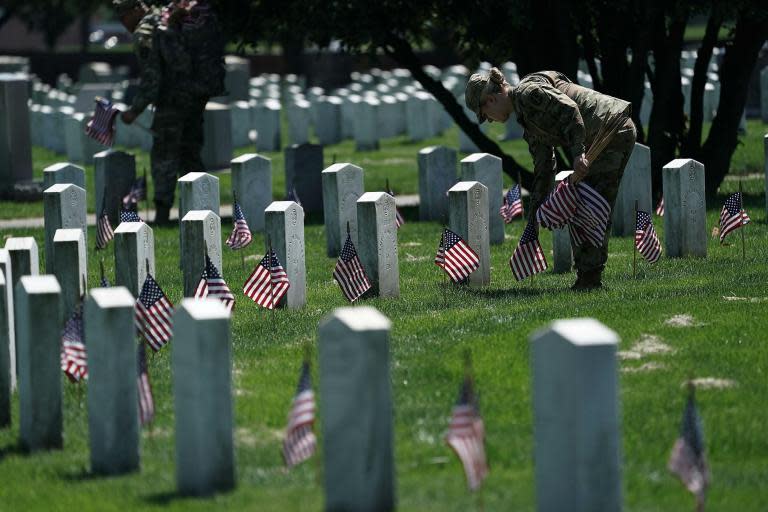Memorial Day: Arlington National Cemetery rapidly running out of room forcing controversial Pentagon rethink
Arlington National Cemetery, America’s most celebrated and hallowed military resting place is rapidly running out of space, forcing a controversial rethink on which veterans should be eligible to be buried there.
The Virginia cemetery, founded at the time of the US Civil War, currently contains the remains of 420,000 former servicemen and women, among them assassinated US president John F Kennedy. It is also the location of the Tomb of the Unknown Soldier and the focus of official remembrance events such as those of Memorial Day.
Rules concerning who is eligible to be buried there are reasonably relaxed. The cemetery says while eligibility regulations for burial at Arlington are the most stringent of all US national cemeteries, most veterans who have at least one day of active service and an honourable discharge, are at least eligible for the internment of their ashes.
Yet officials say at the current rate – there are currently between 27-30 funeral services each week day – the cemetery will run out of space in approximately 23 years. The army has been asked by congress to consider what can be done to extend the site as an active cemetery beyond 2041.
Officials have started a public discussion, asking for opinions and suggestions on how best to extend the cemetery’s use.
It is an intensely sensitive topic. While officials have sought to try to buy more space to extend the cemetery’s 624 acres, another proposal would be to tighten the rules regarding who can be buried there.
No matter how many years go by, I will always remember. pic.twitter.com/OtoMEAz5V7
— John Towles (@J_Towles) May 28, 2018
The New York Times reported the strictest proposal being considered by the army would allow burials only for service members killed in action or awarded the military’s highest decoration for heroism, the Medal of Honour. It said under those restrictions, Arlington might conduct fewer burials in a year than it does right now in a single week.
Last year, it was reported a deal had been done between the military and officials in Arlington County that would allow the cemetery to expand onto adjoining land and create room for an additional 50,000 spaces. That would extend the life of the cemetery by 10 to 15 years beyond 2050. Yet officials realise this in only a medium term solution.
The army said it is determined the public, and veterans and their families, have a say on the cemetery’s future. “Your opinion matters – not only to us, but to our military and civilian leaders as they face a difficult future for our hallowed national shrine,” Karen Durham-Aguilera, executive director of Army National Military Cemeteries, said last month.
Katharine Kelley, Arlington National Cemetery superintendent, said: “We continue our promise to publicly discuss this challenge in order to make the correct decision, but we cannot expand our way out of this problem.”
Officials point out that Arlington is not the only place for military burials. The Department of Veterans Affairs maintains 135 national cemeteries across the country, but Arlington is by far the most popular. Even as President Donald Trump laid a wreath at the Tomb of the Unknown Solider on Monday, officials also recognise that if burials came to an end, the site would probably serve more as a museum than an active cemetery.
The idea of limiting eligibility is controversial. John Towles, a legislative deputy director for Veterans of Foreign Wars (VFW), who represents 1.7 million veterans, has testified before congress that it would be wrong to go back on a promise made to all veterans that they could be buried at Arlington.
He believes burials should continue at Arlington at the current rate, and then a new cemetery established that would eventually become just as significant. His organisation has already identified other potential sites.
In testimony in March before a subcommittee of the House of Representatives’ Committee on Armed Services, he said the only eligibility restriction proposal the VFW supported was to require a veteran buried there to have completed two years of active-duty service. That did not include those veterans killed in action.
He said: “The VFW has an obligation to advocate for and preserve the integrity of the option best suited to do the most good for the most number of veterans. Restricting eligibility to a very small category of veterans is not feasible if the true goal is to provide those who deserve to be laid to rest in America’s most hallowed grounds the ability to do so.”
Arlington National Cemetery and the Department of Defence have been contacted for comment.


